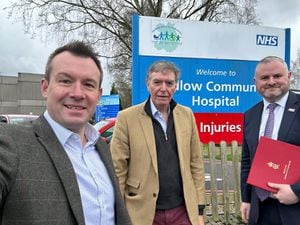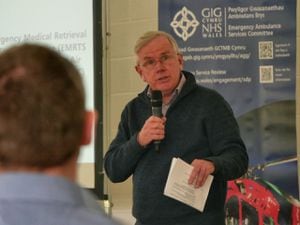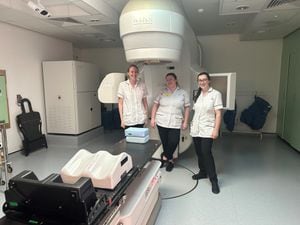Noel Conway: Terminally ill Shrewsbury man starts Appeal Court challenge on right to die ruling
A terminally ill Shrewsbury man has said he should not have to undergo a "distressing and undignified" death as judges consider his Appeal Court challenge against a ban on assisted dying.
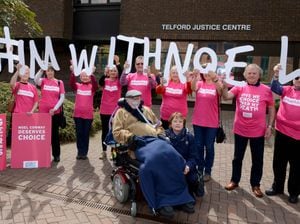
Motor neurone disease sufferer Noel Conway, who says he feels "entombed" by his illness, is fighting a legal battle for the right to enlist help from medical professionals to bring about his death.
The 68-year-old retired lecturer wants to be helped to die - which the law currently prevents - when he has less than six months left to live, still has mental capacity to make the decision and has made a "voluntary, clear, settled and informed" decision.
Watch - Noel Conway arrives at Telford court to watch case by video link:
He has proposed that he could only receive assistance to die if a High Court judge determined that he meets all three of those criteria.
Outlining his case to three senior judges on Tuesday, Mr Conway's lawyers said the law as it stands interferes with his rights and that the court must decide whether that interference is "justified and proportionate".
Nathalie Lieven QC said: "The question for this court is not a very generalised one of the morality or ethics of allowing doctors to assist patients to die.
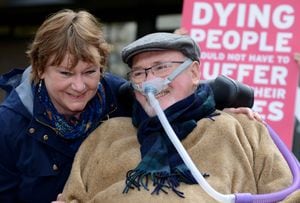
"The question for this court is rather a focused one of whether for this very specific cohort, ie, terminally ill people with less than six months to live, the ban is justifiable because of an impact on the weak and vulnerable."
Mr Conway previously asked the High Court for a declaration that the Suicide Act 1961 is incompatible with Article 8 of the European Convention on Human Rights, which relates to respect for private and family life, and Article 14, which protects from discrimination.
His case was rejected in October last year, but a full appeal against that ruling will begin on Tuesday.
Mr Conway is too unwell to travel to London for the hearing but will watch proceedings over a video link from Telford County Court.
In a statement ahead of the hearing, he said he is now dependent on a ventilator for up to 23 hours a day and only has movement in his right hand, head and neck.
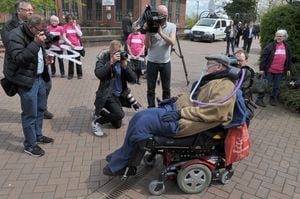
Mr Conway said his current options are to "effectively suffocate" by choosing to remove his ventilator or to spend thousands of pounds travelling to Switzerland to end his life and have his family risk prosecution.
Ms Lieven told the court there is "serious objective evidence" upon which Mr Conway concludes there is a real risk his death would not be "quick and painless" if he refuses ventilation.
She added: "Mr Conway reiterates that, if suitable safeguards are in place, the wider interests of society cannot possibly be said to require him to undergo such a death in the name of securing against possible risks to weak and vulnerable individuals."
The barrister argued that a proper analysis of the safeguards proposed by Mr Conway would have shown that the current "blanket ban" on assisted suicide is not necessary.
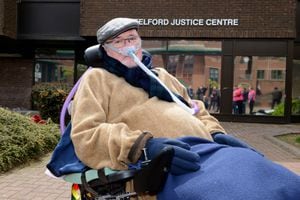
She said the proposal of having a High Court judge oversee the process was "at the heart" of the issue.
Ms Lieven also argued Mr Conway's proposals could not pose any "wider risk" to society.
She said: "Mr Conway is dying because of the effects of his illness any change in the law could not, itself, increase the number of those with terminal illnesses.
"It could not therefore, per se, give rise to any increase in risk of death amongst (for instance) those with disabilities who are not terminally ill, and hence any wider risk to the general community.
Interest
"Indeed, it could just as easily be said that the real question is not whether the wider interests of society require Mr Conway to be denied assistance with dying, but whether society, as a whole, can be said to have any legitimate interest in denying Mr Conway any choice in when and how he dies in circumstances where he is already dying in other words, to exercise one of the few meaningful decisions about his end of life that remain available to him."
Ms Lieven said it was for Mr Conway to decide what he considers to be "distressing and undignified" and that he is the "best judge" on a matter as "intimately personal" as how he dies.
Mr Conway is being represented by law firm Irwin Mitchell and supported by the campaign group Dignity in Dying.
His appeal is opposed by the Secretary of State for Justice, with Humanists UK, Care Not Killing and Not Dead Yet UK also making submissions.
The appeal before Sir Terence Etherton, Sir Brian Leveson and Lady Justice King is expected to last three days.
‘Giant graveyard’ protest outside courts as case opens
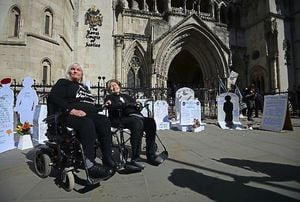
Disability Rights campaigners created a ‘giant graveyard’ outside the Royal Courts of Justice today to highlight what they says is the danger of Noel Conway’s legal challenge.
The visual display was created by disability group The Distant Voices.
Nikki Kenward, who has Guillain-Barré syndrome and organised the display, says that if it were successful, Mr Conway’s challenge would have huge consequences for her and other disabled people.
She said: “Should Mr Conway win his case it will change my life forever. As a disabled person I am only too aware that some people see me as having ‘no quality of life.’
“A young friend, who has cerebral palsy, and I, were told by a youth worker, ‘If I were you two I’d rather be dead.’ Please don’t tell me I will not be vulnerable if euthanasia is legalised.”
Nikki’s husband and carer, Merv, responding to the case said: “As a carer, one of my greatest fears is what will happen to Nikki if I’m not here to care for her. When I consider the dreadful alternatives that are available, including the looming possibility of euthanasia, I am reminded that those around me have a willingness to see her as a burden, living a life that they would not choose. I worry for her, I have a knot in my stomach when I think of what I know is possible.”
Mr Conway’s appeal is being opposed by the Secretary of State for Justice, with Humanists UK, Care Not Killing and Not Dead Yet UK also making submissions.
Dr Peter Saunders, campaign director of Care Not Killing, said: “The blanket ban on assisted suicide is necessary in a democratic society in the interests of public safety for the protection of the rights and freedoms of others.”
Granting permission for the appeal hearing in January, Sir Ernest Ryder said there was a “serious question” as to whether the High Court gave enough consideration to the evidence before it.
He said there was also an issue as to how it resolved “serious disagreements” between experts.
The judge added that it was important to distinguish Mr Conway’s case, which is concerned with assisted suicide, from euthanasia.

